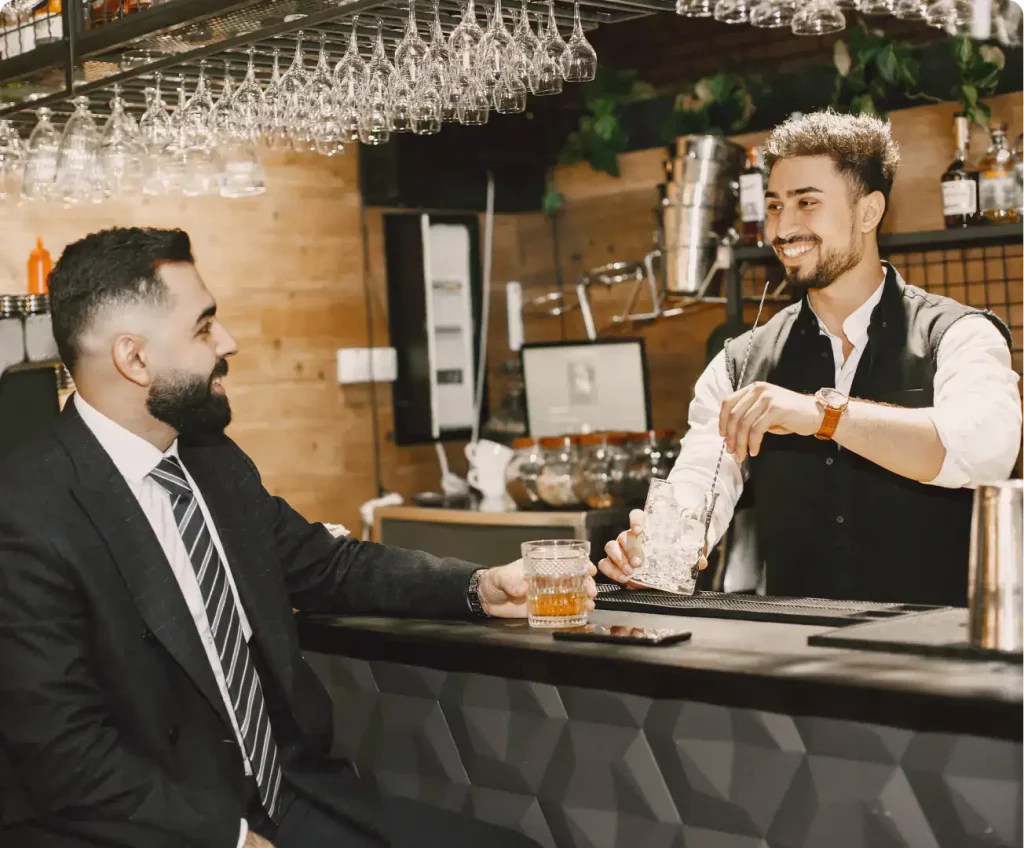The mobile bar industry in the UK is flourishing, offering unique experiences at weddings, festivals, and private events. If you’re considering launching your mobile bar, you need the correct licences to sell alcohol legally. There’s no single “mobile alcohol licence”, but you will need a personal licence, and in many cases, a temporary event notice or premises licence.
This guide walks you through everything you need to legally run a mobile bar, from the proper licences to the rules you need to follow. Whether you’re mixing cocktails at weddings or pouring craft beer at festivals, you’ll learn exactly how to stay compliant and get your mobile bar business up and running with confidence.

Understanding How Alcohol Licensing Works for Mobile Bars
Before you can sell or serve alcohol from a mobile bar, it’s essential to understand how licensing laws in the UK are structured. Alcohol licensing isn’t based on the type of business you run, but rather who is selling the alcohol and where it is being sold. That’s why mobile bars, whether it’s a converted horsebox, trailer, van, or pop-up cocktail stand, must meet the same legal requirements as permanent venues.
To legally sell alcohol, you usually need:
- A Personal Licence, which allows an individual to authorise alcohol sales.
- A Premises Licence, which permits alcohol sales at a specific location.
- A Designated Premises Supervisor (DPS), who holds a personal licence and is responsible for managing alcohol sales at that premises.
However, since mobile bars frequently change locations, not every setup will require a full premises licence. In many cases, you can operate legally under a Temporary Event Notice (TEN), especially for one-off events like weddings, festivals, or private parties.
This flexible system is designed to cover everything from permanent pubs to portable cocktail vans, but it also means mobile bar operators need to be extra careful about what licences apply to each job they take on.
When You Need a Personal Licence
A Personal Licence is essential if you want to sell or authorise the sale of alcohol. It belongs to you as an individual, not your business, so you can use it across multiple locations and events. This is particularly useful in the mobile bar industry, where you might be working at different venues each week.
To get a Personal Licence, you must:
- Be over 18 years old (legal minimum age to sell alcohol)
- Hold an accredited qualification, such as the Award for Personal Licence Holders (APLH) (which proves you understand the alcohol licensing laws)
- Pass a DBS check for a Personal Licence (criminal record check to assess suitability)
- Have the right to work in the UK (legal residency status)
Once you’ve completed your APLH training, Hurak can take care of the entire Personal Licence application process for you. We handle the details and make sure your application is completed correctly and quickly, so you can get your licence without stress.
You only need to apply once, and the licence lasts indefinitely in England and Wales, although your local council must be notified of any changes to your details. For Scotland, you must comply with the Licensing (Scotland) Act 2005, and the licence must be renewed every five years.
Operating in Scotland? Hurak makes it trouble-free!
Get your Scottish Personal Licence (SCPLH) through our simple, expert-led course. We guide you through every step, ensuring your application is seamless and stress-free.
If you lose your licence, you can apply for a replacement or report a lost Personal Licence through your licensing authority.
When a Premises Licence Applies to Mobile Bars
A Premises Licence is required to sell alcohol from a fixed location. For mobile bars, this applies if you operate from a regular pitch or base, for example, a food truck site or permanent festival stall. Unlike the Personal Licence, the Premises Licence is tied to the location, not the person.
Some mobile bar setups do a Premises Licence check to confirm whether a venue already has permission to sell alcohol. If the location already holds a licence, you may only need to provide a DPS or operate under its existing conditions.
If you’re running a bar from your own permanent venue, such as a warehouse taproom or converted trailer based in one place, you will need both a Premises Licence and a Designated Premises Supervisor listed on it.
Need a Premises Licence? We make it easy for you!
Applying for a Premises Licence can be stressful, but with Hurak, you don’t have to worry. Our experienced team will handle your Premises Licence application, managing all paperwork and liaising with authorities so you can focus on your business.
For a more detailed breakdown, see the difference between a Personal Licence and a Premises Licence.
Using Temporary Event Notices (TENs) for One-Off Events
Many mobile bars avoid the complexity of applying for a full premises licence by using Temporary Event Notices (TENs). A TEN allows you to sell alcohol at a specific location for a limited period, usually for events with up to 499 people.
This is the most common route for mobile bar operators working at weddings, birthday parties, pop-ups, or small festivals. It’s straightforward and affordable, but there are limits on how many you can apply for each year:
- A personal licence holder can submit up to 50 TENs per year
- A non-licence holder can apply for up to 5 TENs per year
Each TEN must be submitted at least 10 working days before the event. If you’re running multiple events or larger festivals, you may need a combination of TENs or a premises licence.
If you’re unsure whether your private event needs licensing, read more on: Do I need an alcohol licence for a party?
Where and How You Operate Affects Your Licence Needs
Your licensing needs will depend heavily on the setup and model of your business. A mobile cocktail van operating at ticketed festivals will have different legal obligations than a mobile drinks bar serving complimentary prosecco at corporate events.
In some cases, if you’re giving away alcohol for free, you may not need a licence, but only if there’s no financial exchange involved. For example, giving away drinks at a corporate networking event with no ticket entry may not require a licence. However, the rules can be complex. For example, offering “free” drinks with ticket entry or bundled with a service often still counts as a licensable activity. You can find clarification in guides such as What is test purchasing alcohol?
It’s also worth noting that licensing laws vary slightly across the UK. For example, if you plan to operate in Scotland, you’ll need to comply with the Licensing (Scotland) Act 2005 and hold a valid Personal Licence for Scotland.
Staying Compliant and Avoiding Penalties
Selling alcohol without the correct licence is a criminal offence. Potential penalties include:
- Fines
- Confiscation of stock or bar equipment
- Suspension or revocation of your personal licence
- Criminal charges or a ban from trading
To stay compliant:
- Make sure the right licence covers each event or location.
- Display your licence details clearly at the bar.
- Keep records of TENs or premises permissions.
- Ensure alcohol isn’t served to anyone underage.
- Always have a qualified DPS listed for premises-based sales
It’s also important to consider your staffing and training. If you’re hiring a bartender, check whether they need a bartender’s licence or related qualifications, especially if they are serving unsupervised.
Conclusion
Running a mobile bar legally comes down to getting the correct licences for each event or setup. Most operators will need a Personal Licence, and depending on where you serve alcohol, either a Premises Licence or a Temporary Event Notice (TEN).
There’s no one-size-fits-all solution, but if you understand how alcohol laws work and plan ahead, you can focus on building your business and creating memorable experiences for your clients.
FAQs
Do I need a licence to serve alcohol from a mobile bar?
Yes. If you’re selling or supplying alcohol to the public (even at a private event), you’ll usually need a Personal Licence and either a Premises Licence or a Temporary Event Notice (TEN), depending on where and how you operate.
What’s the difference between a Personal Licence and a Premises Licence?
A Personal Licence allows an individual to authorise alcohol sales, while a Premises Licence allows alcohol to be sold at a specific location. You’ll often need both, but mobile bar operators frequently use TENs for one-off events instead of a full premises licence.
Can I serve alcohol without a Premises Licence if I use a Temporary Event Notice (TEN)?
Yes. If you’re serving alcohol at a one-off event (like a wedding or festival) and meet the criteria, you can apply for a TEN instead of a full premises licence. It’s ideal for temporary setups.
How many TENs can I use each year?
- Personal Licence holders: up to 50 TENs per year
- Non-licence holders: up to 5 TENs per year
What if the venue already has a licence?
If the venue already has a Premises Licence, you may only need a Personal Licence holder (usually you or a team member) to act as the Designated Premises Supervisor (DPS). Always check with the venue in advance.
Do I need a licence if I’m not charging for alcohol?
It depends. If alcohol is given away for free with no form of payment, ticket, or entry fee, a licence may not be required. But if it’s bundled with tickets or services, it could still count as a sale under UK licensing law.
How do I get a Personal Licence?
To apply, you must:
- Be 18 or older
- Complete the APLH qualification
- Pass a DBS criminal record check
- Apply through your local council
Do licensing laws differ in Scotland?
Yes. In Scotland, you must comply with the Licensing (Scotland) Act 2005. Personal Licences require renewal every 5 years and have a mandatory refresher training.
What happens if I operate without the correct licence?
You could face:
- Fines
- Confiscation of stock or equipment
- Loss of your Personal Licence
- A ban on future trading
Where can I find more guidance or apply for a licence?
You can learn more and apply through your local licensing authority or visit our guides:




